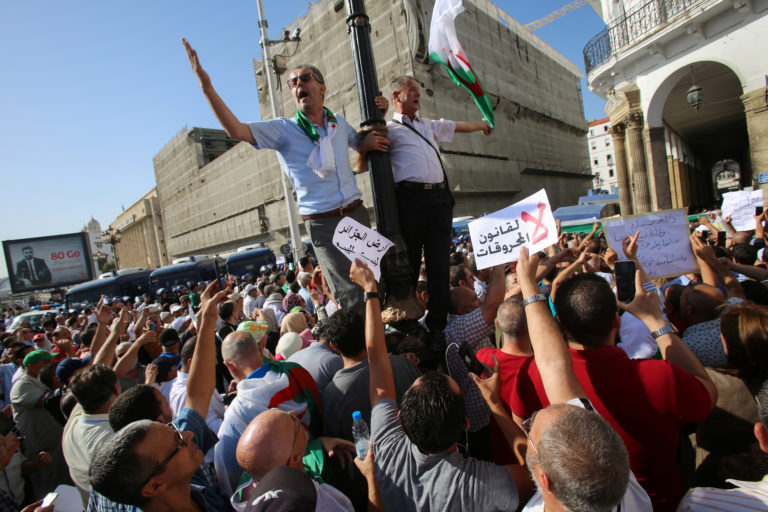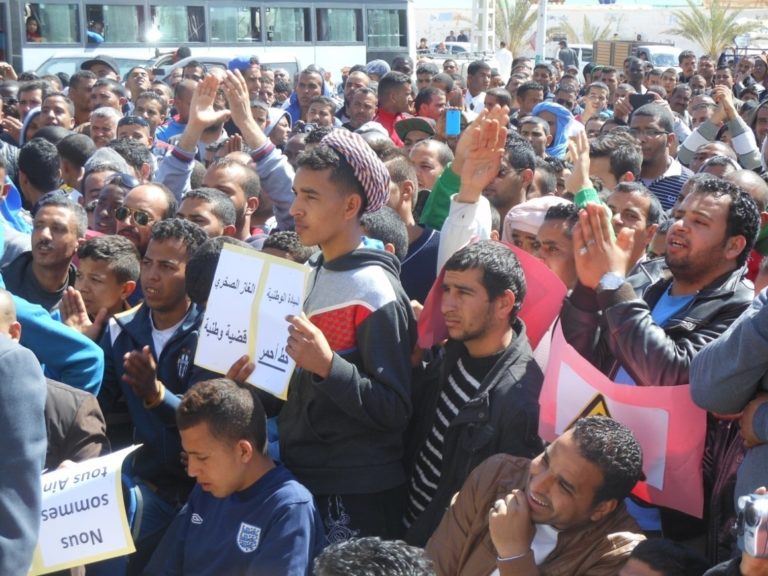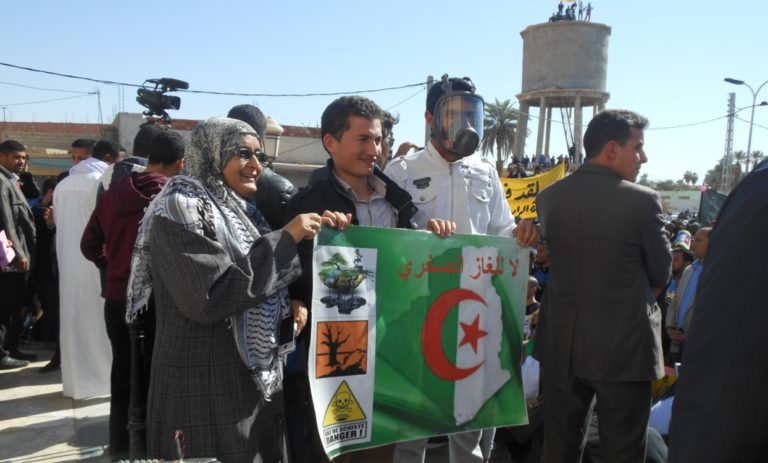
Demonstrators carry national flags and banners during a protest against a proposed new hydrocarbons law in Algiers, Algeria, October 13, 2019. Ramzi Boudina/Reuters
Although the 2019 uprising came as a surprise to many, previous instances of popular mobilization, like the impressive protests against fracking (a method of extracting gas and oil from shale deposits through hydraulic fracturing) that emerged in several southern Algerian cities in 2014 and 2015, not only highlighted the intersection of political and environmental questions, but also paved the way for peaceful modes of resistance. The unprecedented anti-fracking movement helped citizens build coalitions and solidarity networks and forge rebellious identities and subjectivities. Their ideas continued to circulate and were taken up in 2019 and 2020 by the Hirak movement, which linked the shale gas issue to questions of democracy and national sovereignty.
As a result, when parliament adopted amendments to the Hydrocarbon Law in October 2019, which includes references to the exploitation of unconventional hydrocarbons like shale gas, and the role of multinational companies, thousands of citizens demonstrated in front of the parliament building in the capital Algiers.[2] They rejected the law, arguing that it had been drafted by an unpopular and illegitimate regime under the influence of multinational corporations. They also highlighted that economic liberalization would undermine national sovereignty by selling off the country’s wealth cheaply to foreign interests. Large parts of Algerian society, including the elite, consider the nationalization of the hydrocarbon sector in 1971 to be an important moment in fulfilling the promises of independence, which Algerians wrested from France in 1962.
In January 2020, during week 49 of Hirak mobilizations, opposition to fracking emerged as a central theme following Tebboune’s declaration that shale gas was a “divine gift”—using the same expression as his predecessor Bouteflika. Protesters chanted: “There will be no gas, there will be no oil, tell France to exploit [shale gas] in Paris,” and “There won’t be shale gas, Tebboune is not legitimate.”[3] Through these slogans, protestors rejected the president’s legitimacy to make decisions vital for the country’s future. The anti-regime and anti-imperialist tone in the chants mirror the earlier political mobilizations to protect the environment in the south, most prominently in the city of In Salah.[4]
While environmental and health-related concerns over the effects of fracking like the destruction of the sensitive Saharan ecosystem, increased air pollution and earthquakes and the pollution of precious groundwater (especially the Albian Aquifer) were at the heart of the 2014–2015 protests, they also carried a political message. Protesters criticized the highly opaque, and at times contradictory, government statements and upheld fracking as additional proof of the political and social marginalization of those who live in the south of the country. Furthermore, these mobilizations highlighted the determination of citizens to participate actively in the government’s decision-making processes, exposing how the issue of fracking is not only environmental, but also highly political.
A Chronicle of Growing Discontent
In January 2013 the Algerian National Assembly approved the exploitation of non-conventional hydrocarbons, including shale gas, obtained through fracking, which involves drilling horizontally at depth into the rock and injecting huge amounts of water mixed with toxic chemicals and sand under high pressure. In May 2014, Energy Minister Youssef Yousfi announced that the government would begin exploiting shale gas in cooperation with foreign partners. The project identified seven promising basins in the Sahara region, namely Tindouf, Reggane, Timimoun, Ahnet, Mouydir, Ghadames Berkine and Illizi.[5]
The first campaigns to protest against fracking and raise public awareness of its dangers were organized in June 2014 by the Unemployed Movement (Comité National pour la Défense des Droits des Chômeurs, CNDDC) in the Saharan cities of Adrar and Ouargla. Yet, it was only after Energy Minister Yousfi announced the first successful test of drilling for shale gas in the Ahnet Basin just 19 miles away from In Salah on December 27, 2014—without previously consulting or informing the city’s 35,000 inhabitants—that protests erupted in an unprecedented way. Protesters of different social classes, generations and gender installed a camp and occupied a central square that they renamed Sahat al-Somoud (Resistance Square). They organized peaceful daily demonstrations that drew up to 15,000 citizens demanding a stop to the drilling and the beginning of a national debate regarding the transition to renewable energy sources.

Protesters hold signs that read “National sovereignty is the red line,” “Shale gas is a patriotic cause,” and “We are all In Salah” on March 14, 2015, in the city of Ouargla. Photo by the author.
Protesters initiated several actions in southern cities like Tamanrasset, Adrar and Ouargla to express support for the inhabitants of In Salah. The composition of protesters in each city differed according to the types of activist networks already in place. The mobilization in Ouargla, for instance, benefited from the Unemployed Movement’s long experience of grassroots activism. Activists who had previously demanded jobs, social justice and a more equitable distribution of oil wealth now installed a protest tent in the city center and organized a major rally in March 2015. They were joined by high ranking representatives of oppositional political parties who came from Algiers. In In Salah, protests were initiated by the “Committee of 22,” which was made up by engineers and professionals in the energy sector. They were joined by numerous citizens, most remarkably women. In this way, a broad network of solidarity emerged that built on long-standing political organizing, social media presence and a shared sense of outrage against the post-colonial state for the continued marginalization, underdevelopment and neglect of the Algerian population in the south.
“We are not Laboratory Animals”
Protesters justified their mobilization and demands for a moratorium on fracking primarily by pointing out the immediate threat posed to the groundwater, which is a vital resource in the desert that ensures the survival of the local population. Indeed, the Sahara has one of the biggest fossil groundwater reserves in the world, the North West Aquifer System. The groundwater has been used to irrigate traditional oasis agriculture for centuries and has made it possible for Algerians to live in this arid ecosystem. Environmental experts thus critiqued fracking by underlining the large quantity of water necessary for every drilling (up to 15 to 20 million liters), which would aggravate water scarcity.[7] Moreover, the dangers posed by drilling for shale gas and the resulting wastewater lie in the contamination of the water table and in the case of In Salah, the Albian groundwater reserve which contains more than 10,000 billion liters of fossil water.
For some citizens, the fracking project evoked the painful memory of French nuclear testing in the region during the 1960s. Some protesters, especially in Ouargla, focused on the involvement of multinational companies such as French-owned Total and pointed out a paradox: the French government had banned fracking on its own soil but had no qualms about collaborating with Algerian authorities to introduce the practice in the Sahara. Thus, the fracking project was framed as a neocolonial project in which the former colonial power, complicit with an authoritarian regime, contributed to the exploitation of natural resources to the detriment of local populations and their environment. This interpretation was evident in slogans like: “They [the country’s rulers] sold the Sahara for dollars!” whereby protesters accused Algerian elites of securing the support of foreign powers in exchange for access to energy.[8]

Protesters with a sign that says “No to shale gas.” March 14, 2015 in the city of Ouargla. Photo by the author.
During the anti-fracking mobilizations that lasted from December 2014 to May 2015, protesters demanded inclusion in the government’s decision-making processes. They denounced the authorities’ opaque and contemptuous communications as well as their propagation of misinformation that downplayed the risks of fracking. For example, former Prime Minister Abdelmalek Sellal compared the harm caused by fracking to the environmental risks of throwing away a baby diaper in the desert.[9] Relying on the work of experts critical of fracking, citizens of the south refused to be treated as immature subjects, “laboratory animals” or second-class citizens just to perpetuate an authoritarian regime in search of new sources of income. As one protester in Ouargla said during a rally in March 2015: “If fracking is not harmful, as [the authorities] state, then they should drill near the Presidential Palace! We are not laboratory animals!”
After six months of sustained mobilization and the occupation of public squares, punctuated by repressive measures and attempts by the authorities to co-opt the movement, the government finally announced a temporary halt, still in effect, to drilling activities in May 2015. This short-term victory was rooted in the fall of oil prices and calculations regarding economic profitability. Nevertheless, the movement managed to raise awareness about the dangers of fracking and the issue of regional disparities at the national level.[10]
The anti-fracking protests thus provide an interesting lens to view the intersection of environmental questions with issues of equality, social justice and citizenship. The 2015 movement brought the issues of regional disparities and marginalized populations to the fore. By raising the question of who has the right to participate in the state’s decision-making processes, activists in the south equally reaffirmed their demand for a true citizenship. Observers have subsequently argued that this movement was fundamentally about civil rights.[11] The diffusion of ideas, networks and modes of action were fundamental for the emergence of the ongoing and broad-based Hirak movement.
[Naoual Belakhdar is a political scientist affiliated with the Center for Middle Eastern and North African Politics, Otto-Suhr Institute for Political Sciences at Freie Universität Berlin.]
Endnotes
[1]Naoual Belakhdar, “L’Indépendance, c’est maintenant!’ Réflexion sur le soulèvement populaire en Algérie”, L’Année du Maghreb 21 (December 2019) and Muriam Davis, Selma Kasmi “Voices from the Middle East: The Future of the Hirak Movement in Algeria,” Middle East Report Online, April 27, 2020.
[2] Le Monde, “Des Algériens dans la rue contre une loi sur les hydrocarbures“, Octobre 13, 2019.
[3] Mustapha Benfodil, “49e vendredi de mobilisation populaire: Le Hirak rejette énergiquement le gaz de schiste,” El Watan, January 25, 2020.
[4] The quote “Algeria is not for sale!” in the title is by an anti-fracking protester in Ouargla, April 2015.
[5] Observatoire des multinationales, “Total et le gaz de schiste algérien,“ March 2015.
[6] The hydrocarbon sector accounts for roughly 60 percent of budget revenues, nearly 30 percent of Gross Domestic Product (GDP) and over 98 percent of export earnings.
[7] Tim Boersma, Marie Vandendriessche and Andrew Leber, “Shale Gas in Algeria. No Quick Fix,“ Brookings Energy Security and Climate Initiative (November 2015).
[8] Slogan heard during an anti-fracking demonstration in Ouargla, March 13, 2015.
[9] Ghania Mouffok, ”Gaz de schiste en Algérie,” l’info et l’intox, Mondafrique, June 25, 2014.
[10] Isabelle Werenfels “Fracking in Algeria on Twitter: Connecting the Periphery to the Center and the World, #InSalah,” SWP Research Paper 5 (March 2016).
[11] Informal discussion with the Algerian journalist Mohand Aziri, May 2015, Algiers.
